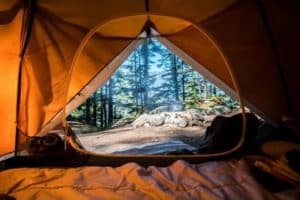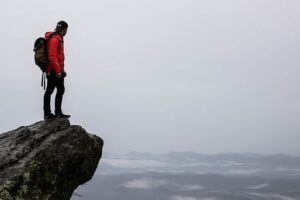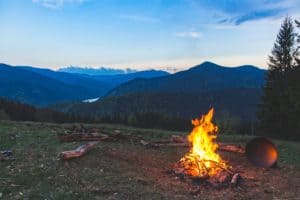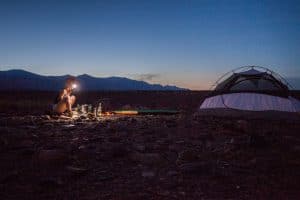We advise finding a place for an overnight stop in advance. It is very important to choose the right place because it will be much more difficult to do it at dusk or at night.
Choosing A Place And Preparation
As we’ve already concluded, it is better to look for a stopping place during daylight hours. This is important because it has to meet a number of requirements.

1) The encampment should be on a hill; avoid hollows, ravines, and dried river beds.
The weather is changeable, it may start raining at any moment and water will quickly flood your place of stay.
It is also forbidden to make a halt under onshore canopies and large trees. In the first case, collapse may happen, in the second case, strong wind or lightning can drop a tree.
In a strong wind it is better to settle down in a place surrounded by bushes or curtains from young trees, if there is no wind choose an open place, as there will be a few fewer midges and mosquitoes.
2) There must be a source of water nearby, preferably a flowing one.
3) There has to be firewood for the fire.
After you’ve found a camping place, choose a spot for a fire. It is best to start a fire in small wet depressions or holes. If there are none, take additional organizational efforts: remove the top layer of turf on the area exceeding the size of a fire, and lay the bricks of ground with grass looking down perimeter-wise of the fire site.
Preparation Of A Camping Place
While the food is being prepared and the clothes getting dry, you should take care of a sleeping place. To do this, clean the ground of flammable materials and build a fire on the spot you’ve chosen. This is done to warm up the ground. After 2-3 hours remove the coals from the fire burning out, clear the place once again.
Next build flooring of branches or boughs where the campfire was. The place to sleep is ready, set a tent if you have one on a layer of branches or simply lay a tourist mat.
If you have little time to prepare for the night, or the preparation itself creates additional noise, for example, if you camp during wood grouse courtship, you can try the following. Put across two or three thick poles on the ground, next put thinner poles tight to each other on top of them.
The resulting bed can be additionally laid with branches, boughs or a mat.
Forest bed is located at such a distance from the fire, so that sparks would not reach a hunter. You need to sleep head to the lee side. To reflect heat and protect yourself against the wind, arrange a wall and a canopy of poles and branches.
A suitable sleeping bag greatly increases the comfort of sleeping in the forest, but in this case you should significantly increase the distance from the fire.
If near to a reservoir, boat put on its side can serve as a temporary shelter.
To protect against the rain, if there is no tent, you will have to build a canopy by means at hand.
Any available waterproof material (a cloak, a piece of tarpaulin, etc.) is stretched between the trees or on the stakes hammered on the sides. If there are no such means, a roof is made from branches and boughs.
Never go to bed in wet clothes, you have to dry them by the fire first.
Equipment And Behaviour On Site
In most cases, if everything is done correctly, overnight stay in the woods does not represent some kind of extreme. To pass unpleasant surprises you should take care of the equipment in advance. The most necessary items in a forest are: matches, an axe, a knife, a compass and a lantern.
When it comes to spending a night in the woods, many people rather get nervous because of darkness and wild beasts, than the lack of comfort. For better and comfortable sleeping, try these out
First advice: do not spend the night in abandoned villages, near anomalous places and next to fast-flowing streams or rivers.
The second problem, it doesn’t exist in fact. The thing is wild animals have no desire to intersect with you, you are a dangerous enemy for them. Only the cries of birds (for example, that of an owl) can scare you.
The cries of bittern and heron can be especially creepy and unpleasant, but there is nothing you can do, just get used to it.
A human often becomes the reason a wild animal approaches a camping area. Do not leave food in the open access and never feed animals so as not to provoke a meeting with them.
Sometimes a bear can put frighteners. This animal usually wanders a safe distance from the fire and occasionally breaks branches showing is a master of the forest.
The real danger in the summer can come only from sick animals that are not afraid of humans. In this case use a burning stick, a knife on the belt, a gun or at least a gas canister.
When leaving the camping site, be sure to put the fire out
This article is only about the overnight stays at positive temperatures. In cold season the stay is arranged differently and requires not only knowledge, but also a lot of experience.
When visiting a forest, it is important for every hunter to be able to make a weather forecast on local observations and the behavior of animals and birds.



